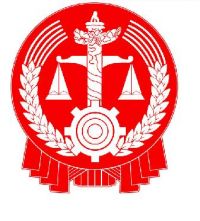Supreme People's Court
The Supreme People's Court (SPC) (最高人民法院) is the highest court in the People's Republic of China.
Since March 2013, the President of the Supreme People's Court and Chief Grand Justice has been Zhou Qiang.
On Dec. 11, 2013, the SPC launched a website for live broadcasts of court trials to allow the public to supervise proceedings.
Contents
Functions
- 1. Conducting trial of the following cases: first-hearing cases placed with the SPC by laws and regulations and those the SPC deems within its jurisdiction; appeals or protests against trial decisions or verdicts of the higher people's courts and special people's courts; appeals against court judgments lodged by the Supreme People's Procuratorate according to trial supervision procedures.
- 2.Giving approval to death sentence. The SPC may, when necessary, delegate the right of approval for death sentences passed against offenders involved in serious cases of killing people, raping women, looting, destruction by using explosives and other cases which severely endanger and harm public security and social order.
- 3. Supervising the trials by local people's courts and special people's courts at different levels.
- 4. On discovering mistakes in the rulings and verdicts of local people's courts already being legally enforced, conducting questioning or appointing a lower level court to conduct re-hearing.
- 5. Giving approvals to verdicts on crimes not specifically stipulated in the criminal law.
- 6. Offering explanations over the concrete application of Laws during the trial process.
Principles for the Work of the SPC
- 1. The principle of equality. All Citizens are equal before the law, so are all the Ethnic groups. No privilege or discrimination is allowed in the application of law.
- 2. The principle of open trials. All cases tried by the people's courts should be conducted openly except those involving state secrets, individual's privacy or offenses committed by minors.
- 3. The principle of defense. The accused is entitled to the right of defense by appointing others or him or her self to defend oneself in the establishment of facts and evidence.
- 4. The system of collegiate panels. When trying first-hearing cases, the SPC shall conduct the trial with a panel consisting of one to three judges and two to four People's Assessors. The trial of cases of appeals shall be conducted with a panel of three to five judges. The panel should be presided over by a judge appointed by the court president or the presiding judge of the tribunal. All members of the panel enjoy the same rights.
- 5. The system of challenge. Litigants have the right to request judicial officers to withdraw from the cases because of their conflict of interest or other special relationship with these cases. The right of deciding the withdraw lies with the president of the court. On the other hand, if judicial officers believe they have conflict of interest or other special relationship with the cases which make their withdrawal from the trial necessary, they shall report to the court president.
- 6. The principle of independence in trials. People's courts enjoy the right of independence in conducting trials according to law. They shall be free from interferences of administrative organs, social organizations and individuals.
The Organizational Setup of the SPC
The SPC is made up of a President, Vice presidents, presiding Judges, vice presiding judges and judges. The SPC operates courts of criminal, civil, economic, administrative trials and other courts set up according to actual needs. Besides, the SPC is also made up by a research office, general affairs office, personnel department, judicial affairs department, administrative affairs department, office affairs bureau, foreign affairs bureau and education department.
The Trial Committee
Consisting of the president, vice presidents, presiding judges, vice presiding judges and judges, the Trial Committee is the leading body of the SPC with the following tasks: summing up experiences in the work of trials, and discussing important or difficult cases and other issues related to trials. Meetings of the Trial Committee are presided over by the president of the SPC. The president of the SPC is elected and removed by the National People's Congress. The vice presidents, presiding judges, vice presiding judges, and other members of the Trial Committee, and judges are appointed and removed by the Standing Committee of the National People's Congress.
Trial Organs
1. The First Criminal Court whose task is to deal with major cases of criminal offense.
2. The Second Criminal Court whose task is to (investigate or) deal with appeals lodged by litigants, the accused, their relatives or other citizens against the verdicts and decisions that are already being enforced, supervise trials and timely correct mistakes that may have occurred in the trials.
3. The Civil Court whose job is to deal with civil cases of national nature.
4. The Economic Court whose job is to deal with major economic disputes.
5. The Administrative Court whose job is to deal with administrative cases involving organs of the Central Government.
The Multi-hearing Trial System
China's trial system follows a two-hearing system in the trial process. The entire system of people's courts constitutes a four-level, two-hearing process. When litigants are not satisfied with the verdict made by any of the local people's courts at various levels after the court has gone through a first-hearing trial of the case within its jurisdiction, they may appeal to a court of the immediate higher level within the time limit prescribed by law. The court at the next higher level reviews the appeal and passes its judgment which constitutes the verdict of the second hearing. According to the trial system, the verdict of the second hearing is the final decision against which the litigant shall not appeal. The SPC is China's highest trial organ and all of its decisions on the first- and second-hearing cases are final and shall be enforced once they are promulgated.
